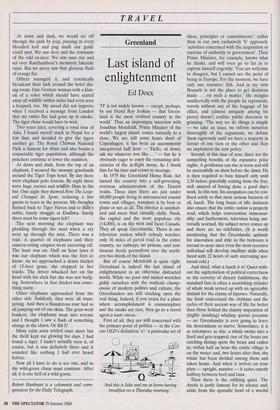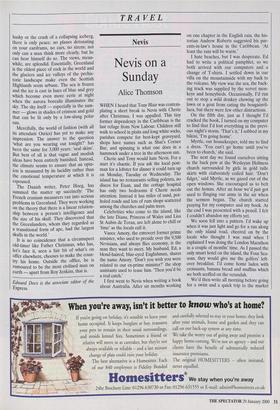Greenland
Last island of enlightenment
Ed Docx
'IT is not widely known — except, perhaps, by our friend Roy Jenkins — that Green- land is the most civilised country in the world.' Thus an impromptu interview with Jonathan Motzfeldt, Prime Minister of the world's largest island, comes naturally to a close. We are still some hours short of Copenhagen; it has been an uncommonly unequivocal half hour — 'Hello, sit down, ask me whatever you like. . ' — but he is obviously eager to enjoy the remaining defi- ciencies of the in-ffight movie. So I thank him for his time and return to steerage.
In 1979 the Greenland Home Rule Act turned the country into a self-governing, overseas administration of the Danish realm. These days there are just under 60,000 people living in unconnected coastal towns and villages; transport is by boat or plane or not at all. The interior is uninhab- ited and more than casually chilly. Nuuk, the capital and the most populous city (14,000), is on the west and faces Canada. They all speak Greenlandic. There is one television station which nobody watches, only 36 miles of paved road in the entire country, no railways, no prisons, and con- tinuous Arctic permafrost over the north- ern two-thirds of the island.
But of course Motzfeldt is quite right. Greenland is indeed the last island of enlightenment in an otherwise distracted world. While we poor and misled wretches giddy ourselves with the methode champ- enoise of modern politics and culture, the Greenlanders are still cracking open the real thing. Indeed, if you yearn for a place where accomplishment is commonplace and the steaks are rare, then go to a travel agent a toute vitesse.
First of all, they are still concerned with the primary point of politics — in the Con- cise OED's definition `a': `a particular set of 'And this is Julie and me at home having breakfast on a Thursday morning.' ideas, principles or commitments'; rather than in our own exclusively 'b' approach: `activities concerned with the acquisition or exercise of authority or government'. Their Prime Minister, for example, knows what he thinks, and will even go so far as to express himself cogently: `You are welcome to disagree, but I cannot see the point of being in Europe. For the moment, we have only one resource: fish. And in my view Brussels is not the place to get decisions made . . . on such a matter.' He mingles unaffectedly with the people he represents, travels without any of the baggage of his office, and (almost uniquely among his peers) doesn't confine public discourse to grinning. `The way we do things is simple — we take an issue, we inform ourselves thoroughly of the arguments, we debate them rigorously until we have a majority in favour of one view or the other and then we implement the new policy.'
Second, at this time of year, there are the compelling benefits of the expansive polar nights. A gentleman can rise at noon and still be successfully on show before the dawn. He is then required to busy himself only until 2.30 before gracefully retiring from the fray, well assured of having done a good day's work. In this way, his occupation can be con- fined solely to that most serious business of all, lunch. The long hours of idle darkness also ensure that the entire nation is properly read, which helps conversation immeasur- ably; and furthermore, television being uni- versally scorned, the subject never comes up and there are no celebrities. (It is worth mentioning that the Greenlandic aptitude for innovation and style in the bedroom is second to none since even the most recessive individual will develop ancillary skills when faced with 22 hours of such enervating noc- turnal cold.) And third, what a lunch it is! Quiet with- out the asphyxiation of political correctness or the corsetry of dietary faddishness, the standard fare is often a nourishing cylinder of whale steak served up with an agreeable disdain for the claims of legumes. Naturally, the Inuit understand the rhythms and the cycles of their ancient way of life far better than those behind the clumsy imposition of (highly insulting) whaling quotas presume — no Greenlander is ever going to leave his descendants to starve. Sometimes, it is as extempore as this: a whale swims into a fiord and gets trapped; one of the boats out catching shrimp spots the beast and radios in; within half an hour the entire village is on the water; and, two hours after that, the whale has been divided among them and taken home. And when it arrives on your plate — upright, massive — it tastes exactly halfway between beef and tuna.
Then there is the edifying quiet. The Arctic is justly famous for its silence and, aside from the sporadic howl of a woeful husky or the crash of a collapsing iceberg, there is only peace: no planes detonating on your eardrums, no cars, no sirens; not only can a man think more clearly, but he can hear himself do so. The views, mean- while, are splendid. Essentially, Greenland is the oldest piece of rock in the world and the glaciers and ice valleys of the prehis- toric landscape make even the Scottish Highlands seem urbane. The sea is frozen and the ice is cast in hues of blue and grey which become even more eerie at night when the aurora borealis illuminates the sky. The sky itself — especially in the sum- mer — glows in shades of crimson and gold that can be lit only by a low-slung polar sun.
Mercifully, the world of fashion (with all its attendant Osrics) has yet to make any impression. The answer to the question 'what are you wearing out tonight?' has been the same for 3,000 years: 'seal skins'. But best of all is that vague and modish ideas have been entirely banished. Instead, the climate seems to ensure that an opin- ion is measured by its lucidity rather than the emotional temperature at which it is espoused. The Danish writer, Peter Hoeg, has summed the matter up succinctly: 'The French cranium measurers ran into serious problems in Greenland. They were working on the theory that there is a linear relation- ship between a person's intelligence and the size of his skull. They discovered that the Greenlanders, whom they regarded as a transitional form of ape, had the largest skulls in the world.'
It is no coincidence that a circumspect Old-timer like Father Christmas, who has, let's face it, seen a fair bit of what's on Offer elsewhere, chooses to make the coun- try his home. Outside the office, he is rumoured to be the most civilised man on earth — apart from Roy Jenkins, that is.
Edward Docx is the associate editor of the Express.



















































































 Previous page
Previous page